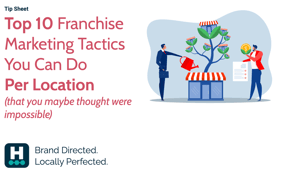Franchise Digital Marketing - Top 10 Strategies to Execute Per Location
As a franchise brand, you likely take a per-location approach to help operational efficiency,...

The franchise disclosure document (FDD) is a standard legal agreement between a corporate brand and its franchisee. Presented and signed at the purchase of every store, territory, or location, the document outlines fees owed to the brand and the franchisee’s required marketing spend, among other things. It’s the corporate brand “disclosing” all of these stipulations to their new franchisee.
But what does this FDD leave unanswered?
For many franchisees, details on digital marketing are sorely lacking in the structure provided to them by HQ. While it is standard for FDDs to outline what owners are required to invest in local advertising for their own location(s), as well as how much they owe back to corporate for national ad campaigns, few details are provided beyond those lump sum demands. How do franchisees execute marketing efforts to meet their required spend? And where does money go after it’s given back to corporate?
Corporate brands need to empower their franchisees with streamlined digital marketing options that help them easily run, or participate in, local campaigns. They also need to remedy the lack of accountability surrounding how corporate ad budgets get spent and whom these campaigns support. By addressing both of these pain points, HQ will strengthen relationships with franchisees and build trust that drives business success at the national and local levels.
Franchisees expect a certain level of support from the corporate brand, and this guidance is often what draws individuals to the franchise model. They want the benefit of pre-existing systems.
Per the agreement outlined in every FDD, franchise owners are required to spend a certain percentage of their revenue on marketing their location(s) through pre-approved vendors and prove this to corporate with receipts. But there is often no guidance or support for franchisees in reaching these goals. For people expecting a playbook from corporate, this is an abrupt departure from the structural support that many franchisees expect.
These franchisees are business owners — not marketers. Why should they have to muddle through building campaigns and sourcing the outlets where they will run? It’s a strain on resources and a distraction from a franchisee’s true skillset as a business operator. Left to find pre-approved vendors on their own, many franchisees don’t spend this ad budget because they don’t know how to.
To address this frustration and inefficiency, corporate brands can provide their franchisees with marketing tools to use as building blocks for launching their own local campaigns. Hyperlocology offers a platform that houses these resources for franchisees. Allowing franchisees to slot their business locations into corporate’s national or regional campaigns or build their own with pre-approved creative and keywords, the platform also runs the ads by integrating with Hyperlocology’s ad server systems.
In short, Hyperlocology’s interface lets franchisees quickly and easily launch campaigns, spend their required marketing budget, and measure success to build confidence. And because campaigns are all housed in one system, franchisees can analyze their marketing efforts and results without having to request any reports.
Marketing spend is just one part of what corporate brands require of their franchisees. Every franchisee also owes a portion of their revenue back to corporate, where it gets added into the brand’s overall marketing budget. But most franchisees don’t understand what happens to that money once they hand it over.
To increase transparency, corporate brands need to work on how they communicate their marketing efforts and campaign results on a per-location level to the franchisees in their organizations. Stakeholders will be more willing to pay what they owe when they understand what the money is going toward and how it might boost their business.
But the way that corporate brands distribute their ad spend is often not equitable for all of their locations. For instance, if corporate wants to run a campaign to boost business in Tennessee, they might base their messaging on customer profiles in Nashville, where they have the most storefronts. But when this campaign runs statewide, it misses the mark for all of the locations in more rural regions, even though those rural storefronts had to contribute to the campaign’s funding. When corporate ads are calibrated on the DMA level, audience nuance is lost, and franchisees get left out.
By grouping stores based on market trends rather than DMA, Hyperlocology’s audience targeting captures the diversity within individual location market areas and unlocks a level of customer psychology that transcends zip code. These methodologies prevent regional campaigns from getting co-opted by the trends in urban areas or controlled by franchisees who own the most locations.
Hyperlocology’s platform lets franchisees log in and see where corporate ad campaigns are having an effect. By granting franchisees visibility into how campaigns are boosting business, everyone can feel more involved in the work and the brand, and corporations can prove their accountability to franchisees.
The FDD is the starting point for every relationship between a franchisee and corporate. As the foundation of the business partnership, it should include as few ambiguities as possible. When corporate brands require franchisees to run their own campaigns, they need to provide them with the infrastructure and toolkits for success. And where corporate takes revenue from franchisees, they need to make sure they are spending that money equitably for all locations and then communicating those efforts back to their franchisees.
Hyperlocology’s marketing resources help franchisees build confidence in themselves and in the corporate brands they serve. By giving franchisees the tools to easily build and run campaigns in accordance with corporate guidelines, brands will enjoy a unified identity and can hone messaging across locations. And by running both individual and corporate campaigns on Hyperlocology’s platform, brands can analyze their aggregate marketing efforts to identify keywords or creative that resonate with certain location-level audiences.
Hyperlocology’s per-location approach to audience targeting positions brands to run campaigns that benefit all of their stores and stakeholders, and Hyperlocology’s software reflects this equity directly back to each and every franchisee. This transparency is key to building trust between franchisees and brands, which will drive smoother collaboration.
When companies deploy Hyperlocology’s software to add clarity and transparency to FDD guidelines, franchisees are more likely to spend their individual marketing budgets, as well as to contribute to corporate’s budget. Hyperlocology is even getting written into some FDDs now, and the company’s goal is to appear in more of these documents to ensure the marketing success of franchise organizations from every angle.
Upon adopting Hyperlocology’s software, corporations are surfacing millions in advertising budgets that previously never made it to market. By making it easy for franchisees to hit their spend and helping corporate brands run campaigns equitably and transparently, Hyperlocology strengthens the human relationships that underpin every franchise organization’s well-being.


As a franchise brand, you likely take a per-location approach to help operational efficiency,...
.png?height=175&name=Hubspot%20Blog%20Size%20(1).png)
The decentralization of digital advertising in franchise systems, which comes from allowing...